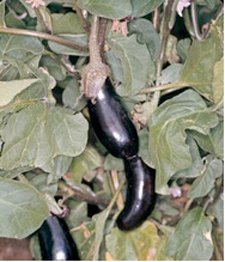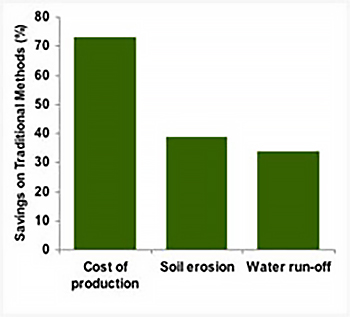Paraquat has enabled the development of two new production technologies for vegetable farmers in the Philippines: Bilis Saka and Bilis Linis. These techniques are only possible because paraquat’s key characteristics as a herbicide are that it controls almost all weeds, but only by contact action, and is inactivated as soon as it reaches the soil. Bilis Saka is used to establish crops in a weed-free soil without the need to plough and Bilis Linis allows weeds growing between the rows of plants to be controlled without fear of damaging the crop.
Value in vegetables
 Eggplant - a popular vegetable in the Philippines
Vegetable growing is the most profitable enterprise for smallholder farmers in the Philippines and generates jobs both on the farm and in the distribution chain in rural and urban areas. For millions of people relying mainly on staple foodstuffs such as rice and corn, vegetables are the solution to the ‘hidden hunger’ caused by lack of vitamins and minerals in the diet. Deficiencies not only lead to many growth and development disorders in children and adults, but also affect the immune system and susceptibility to infection.
Eggplant - a popular vegetable in the Philippines
Vegetable growing is the most profitable enterprise for smallholder farmers in the Philippines and generates jobs both on the farm and in the distribution chain in rural and urban areas. For millions of people relying mainly on staple foodstuffs such as rice and corn, vegetables are the solution to the ‘hidden hunger’ caused by lack of vitamins and minerals in the diet. Deficiencies not only lead to many growth and development disorders in children and adults, but also affect the immune system and susceptibility to infection.
Bilis Saka and Bilis Linis
The key issues and constraints to improved vegetable production in the Philippines have been described by the Australian Centre for International Agricultural Research as:
- Efficiency and sustainability of production
- Crop safety and quality
- Post-harvest losses
Bilis Saka and Bilis Linis are paraquat-based systems which form a strong foundation to address these issues.
Farmers traditionally plough as the first of several cultivations to prepare a seedbed and control weeds. This incurs high costs, takes a lot of time and leads to soil erosion. Later, when crops are established, weeding is a major burden on farmers and their families.
 Benefits from Bilis Saka and Bilis Linis over traditional farmer practice
Scientists at Benguet State University in the north of the Philippines have worked with vegetable growers to investigate the benefits of adopting Bilis Saka and Bilis Linis techniques. In the first season of trials on potatoes and cabbages Bilis Saka and Bilis Linis methods were found to reduce soil erosion and water run-off by over one third and to reduce farm input costs by 73%.
Benefits from Bilis Saka and Bilis Linis over traditional farmer practice
Scientists at Benguet State University in the north of the Philippines have worked with vegetable growers to investigate the benefits of adopting Bilis Saka and Bilis Linis techniques. In the first season of trials on potatoes and cabbages Bilis Saka and Bilis Linis methods were found to reduce soil erosion and water run-off by over one third and to reduce farm input costs by 73%.
Bilis Saka involves only cultivating fields in narrow strips in which rows of crops will be planted. Weeds are then controlled by paraquat and seeding or transplanting can follow immediately because paraquat is deactivated on contact with soil.
Vegetable growers found that excellent weed control was achieved within a day or so of spraying. Important grass weeds such as Eleusine indica and Digitaria ciliaris and broadleaves like Commelina diffusa and Euphorbia hirta were quickly burned down by spraying as little as 80 ml of formulated paraquat diluted in 16 litres of water through a knapsack sprayer. The ground was free of weeds for several weeks, but new weed seedlings eventually emerged and perennials re-grew. Small weeds protect soil from erosion by rain and do not reduce yields so long as they can be controlled again before they compete with the crop.
This is where Bilis Linis comes in. Paraquat cannot damage crop plants by root uptake and if sprayed carefully will not damage crop foliage either. Unlike systemic herbicides such as glyphosate, paraquat only destroys green tissue in immediate contact and does not move to growing points. So, using Bikis Linis, paraquat is sprayed to control weeds growing between the crop rows before they compete with the crop, harbour pests and diseases or interfere with harvesting.

